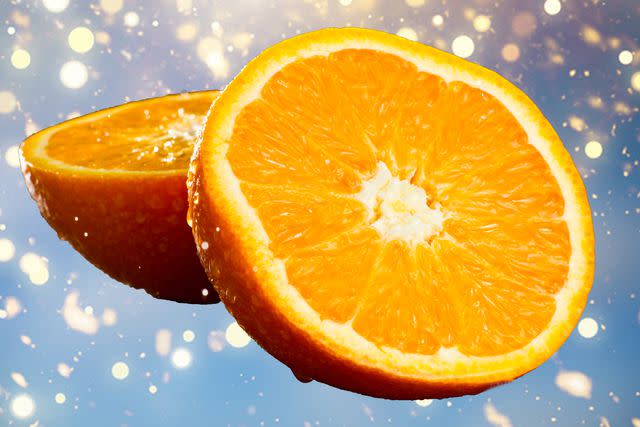Does Eating an Entire Orange—Peel and All—Really Help You Instantly Poop? Here's What a Dietitian Has to Say
We dug into the science to see if this trend is worth trying.
Reviewed by Dietitian Christa Brown, M.S., RDN, LD
Dealing with constipation is not pleasant. Between the bloating, straining and overall discomfort, it makes sense why people may turn to any remedy that offers the promise of fast relief. To help people who are struggling, health influencer Bethany Ugarte-Cameron (@lilsipper on Instagram), has a unique remedy for helping people "instantly poop."
Related: 8 Things Dietitians Eat When They're Constipated
In an Instagram reel, Ugarte-Cameron shared her constipation remedy, which involves washing an orange under warm water, slicing into wedges, then generously coating each wedge in cinnamon and cayenne pepper before eating the whole thing—peel and all.
According to Ugarte-Cameron, "This works every time, in about 5 minutes."
Plenty of social media trends have been less-than-impressive, and in some cases, completely unsafe (we're looking at you, Nyquil-marinated chicken). So we have to ask the question: is trying this "hack" worth it, or is it just another trend that's best left on the screen, rather than in our bellies? Food Science Babe posted a Reel highlighting one person's experience with this particular wellness hack, which resulted in a burned esophagus and a trip to the emergency room.
Related: 8 Things Dietitians Eat When They're Constipated

Can Eating an Orange Covered in Cinnamon and Cayenne Pepper Really Offer Constipation Relief?
Ugarde-Cameron gave a brief explanation as to why this spicy-citrus combo works for her.
Oranges contain the compound, naringenin, which she explains is "a flavonoid shown to help with constipation in general," and that "naringenin can also have a laxative effect." She even references studies to confirm these statements.
But, the two studies the creator references in her caption are based on animal studies—one on mice and the other on rats. While animal studies can give us a glimpse into the effects certain nutrients may have, unless we have human studies to back these claims, we can't make assumptions that the same effect will be seen in a human body, as it did in a rodent body.
Ugarte-Cameron goes on to explain, "Cayenne pepper and cinnamon contain capsaicin, which trigger your TRVP1 receptors (located in your mouth and also throughout your body and GI tract) and stimulate your GI tract—making things move through quite fast!"
The TRPV1 receptor Ugarde-Cameron refers to is in fact activated by the capsaicin molecule, as well as heat and low pH. The receptor's purpose is to help your body detect heat and pain. And while there may be a link between triggering these receptors and stimulating the gastrointestinal (GI) tract, until we have well-designed clinical studies to back that claim, that connection can't be assumed.
Should You Try This Trend?
Digital creator Dani Lutin's harrowing account of what happened when she tried this trend is enough to keep us far away from it. In the response Reel, Food Science Babe reminds people to "beware of what you hear from wellness influencers and their hacks. They can be very harmful."
The individual ingredients on their own offer some health benefits, though. The orange flesh and rind both contain fiber, a key nutrient that helps maintain regular bowel movements. A whole, unpeeled orange delivers 8 grams of fiber, which is roughly one-third of the daily recommended goal according to the 2020-2025 Dietary Guidelines for Americans. Plus, juicy oranges can help you stay hydrated—another important factor when looking for constipation relief.
Orange rinds often contain pesticide residue, but eating one whole orange every now and again likely won't hurt. (Research shows it's exposure to pesticides in large quantities that can increase your risk for negative health outcomes.) And washing your orange under warm water prior to eating helps remove some of that residue by 24-84% according to a study conducted by Foods.
The capsaicin molecule found in both cayenne and cinnamon has been shown to have a positive effect on the gut microbiota. And the healthier your gut bacteria, the fewer GI issues you may encounter. Just keep in mind that for some people, eating capsaicin-containing ingredients in large quantities may bring on uncomfortable symptoms such as heartburn, diarrhea and cramping.
If you’re looking to improve constipation, rather than try an unproven wellness "hack," seek advice from a medical professional, like a registered dietitian. They can empower you to make informed decisions about your dietary choices and optimize your overall health and well-being. By working with a healthcare provider, you can develop a personalized nutrition plan that aligns with your individual preferences, health goals and unique dietary requirements.
The Bottom Line
While the individual ingredients included in this trendy hack to help with constipation may be healthy, consuming large amounts of capsaicin-containing ingredients (like cinnamon and cayenne) can cause digestive distress.
Instead, if you're dealing with constipation, try science-backed remedies to keep things moving. A fiber-rich snack, like chia seed pudding, paired with water may help. Or try our quick-to-make Healthy Gut Tonic with Chia for even faster relief. “Chia seeds are a great high-fiber food to incorporate into your diet,” says Alyssa Pacheco, RD, from The PCOS Nutritionist. Pacheco says you'll get 10 grams of fiber from just 2 tablespoons of chia seeds.
Research has also shown that eating prunes every day can improve stool consistency and frequency, as can kiwifruit. “The fiber found within the cell walls of kiwis have a higher capacity to retain water, potentially resulting in softer stools,”says Julie Balsamo, M.S., RDN.
These foods may help if you're experiencing occasional constipation. But if you're experiencing chronic constipation, we recommend discussing solutions with your health care provider rather than leaning on social media for remedies.
Read the original article on Eating Well.

